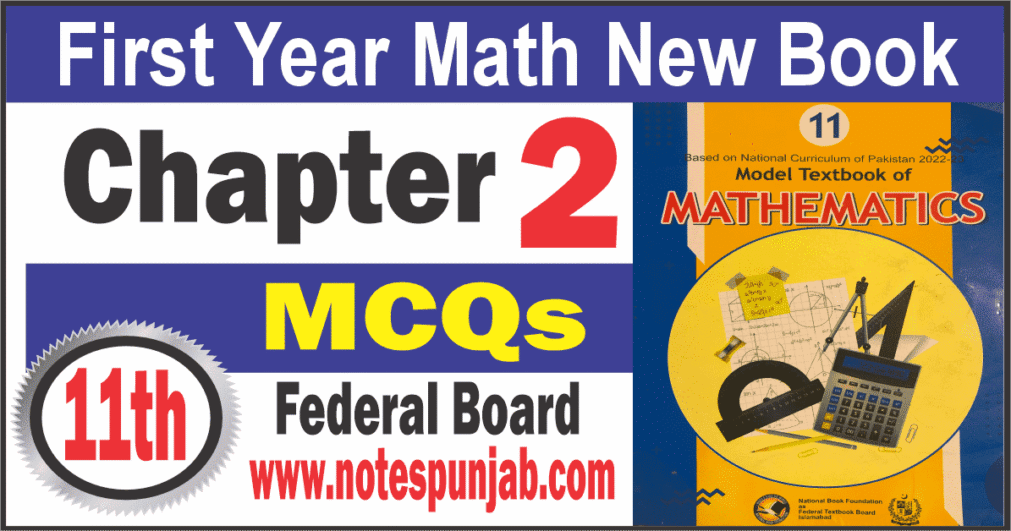MCQs 11th Class Math Chapter 2 Federal Board
MCQs 11th Class Math Chapter 2 Federal Board
(i):-
If order of A is m x n and order of B is n x p then the order of AB is:
(a) n x p (b) m x p
(c) p x m (d) n x n
Option b is correct.
=========================================
(ii):-
$$If\;A\;is\;row\;matrix\;of\;order\;1\times n\\the\;order\;of\;A^tA\;is\;:\\(a)\;1\;\times\;n\\(b)\;n\;\times\;1\\(c)\;1\;\times\;1\\(d)\;n\;\times\;n\\$$
option d is correct.
=========================================
(iii):-
$$For\;an\;element\;{\mathrm a}_{\mathrm{ij}}\;\mathrm{of}\;\mathrm a\\\mathrm{square}\;\mathrm{matrix}\;\mathrm A:\\(\mathrm a)\;{\mathrm a}_{\mathrm{ij}}\;=\;{(-1)}^{\mathrm i+\mathrm j}\;{\mathrm A}_{\mathrm{ij}}\\(\mathrm b)\;{\mathrm a}_{\mathrm{ij}}\;=\;{(-1)}^{\mathrm i+\mathrm j}\;{\mathrm M}_{\mathrm{ij}}\\(\mathrm c)\;\frac{{\mathrm A}_{\mathrm{ij}}}{{\mathrm M}_{\mathrm{ij}}}\;=\;{(-1)}^{\mathrm i+\mathrm j}\\(\mathrm d)\;{\mathrm a}_{\mathrm{ij}}\;=\;\;{\mathrm M}_{\mathrm{ij}}$$
Option c is correct.
=========================================
(iv):-
$$\mathrm{If}\;\mathrm A\;\mathrm{is}\;\mathrm{any}\;\mathrm{square}\;\mathrm{matrix}\\\mathrm{then}\;\mathrm A\;\mathrm{and}\;\mathrm A^{\mathrm t}\;\mathrm{are}\;\mathrm{always}\\\mathrm{conformable}\;\mathrm{for}\\(\mathrm a)\;\;\mathrm{Addition}\;\\(\mathrm b)\;\;\mathrm{Multiplication}\\(\mathrm c)\;\;\mathrm{Subtraction}\\(\mathrm d)\;\;\mathrm{All}\;\mathrm{of}\;\mathrm{these}$$
Option d is correct.
=========================================
(v):-
$$\mathrm{If}\;\mathrm A\;is\;a\;\mathrm{square}\;\mathrm{matrix}\;of\;order\\3\times3\;and\;\left|A\right|=3\;then\;the\\value\;of\;\left|adj\;A\right|\;is\;:\\\\(\mathrm a)\;3\;\;\;(\mathrm b)\;\frac13\;\;\;(\mathrm c)\;9\;\;\;(\mathrm d)\;\;6$$
Option c is correct.
=========================================
(vi):-
$$For\;the\;square\;matrix\;A\;of\;order\\3\times3\;with\;\left|A\right|=9;\;A_{21}=2;\\A_{22}=3;\;A_{22}=3;\;A_{23}=-1;\\a_{21}=\;-1;\;a_{23}=2\;then\;the\\Value\;of\;a_{22}\;is\\\\$$
(a) 2 (b) 3 (c) 9 (d) -1
No one is correct
$$\left|A\right|=a_{21}A_{21}+a_{22}A_{22}+a_{23}A_{23}\\9=(-1)(2)+a_{22}(3)+(2)(-1)\\9+4\;=\;3\;a_{22}\\a_{22}=\frac{13}3\\\\$$
=========================================
(vii):-
System of homogeneous linear equations has non-trivial solution if:
$$(a)\;\left|A\right|>0\;\;\;(b)\;\left|A\right|<0\\(c)\;\left|A\right|=0\;\;\;(d)\;\left|A\right|\neq0\\\\$$
Option c is correct
=========================================
(viii):-
For non-homogeneous system of equations; the system is inconsistent if:
$$(a)\;Rank\;A=\;Rank\;A_b\\(b)\;Rank\;A\neq\;Rank\;A_b\\(c)\;Rank\;A<\;no.\;of\;variables\\(d)\;Rank\;A_b>\;no.\;of\;variables$$
Option b is correct
=========================================
(ix):-
For non-homogeneous system of equations with three variables system will have unique solution if
$$(a)\;Rank\;A<3\\(b)\;Rank\;A_b<3\\(c)\;Rank\;A=Rank\;A_b=3\\(d)\;\;Rank\;A=Rank\;A_b<3$$
Option c is correct
=========================================
(x):-
A system of non-homogeneous equations having infinite many solutions can be solved by using
(a) Inversion method
(b) Cramer’s rule
(c) Gauss-Jordan method
(d) all of these
Option c is correct
=========================================
Check! Some important links below




